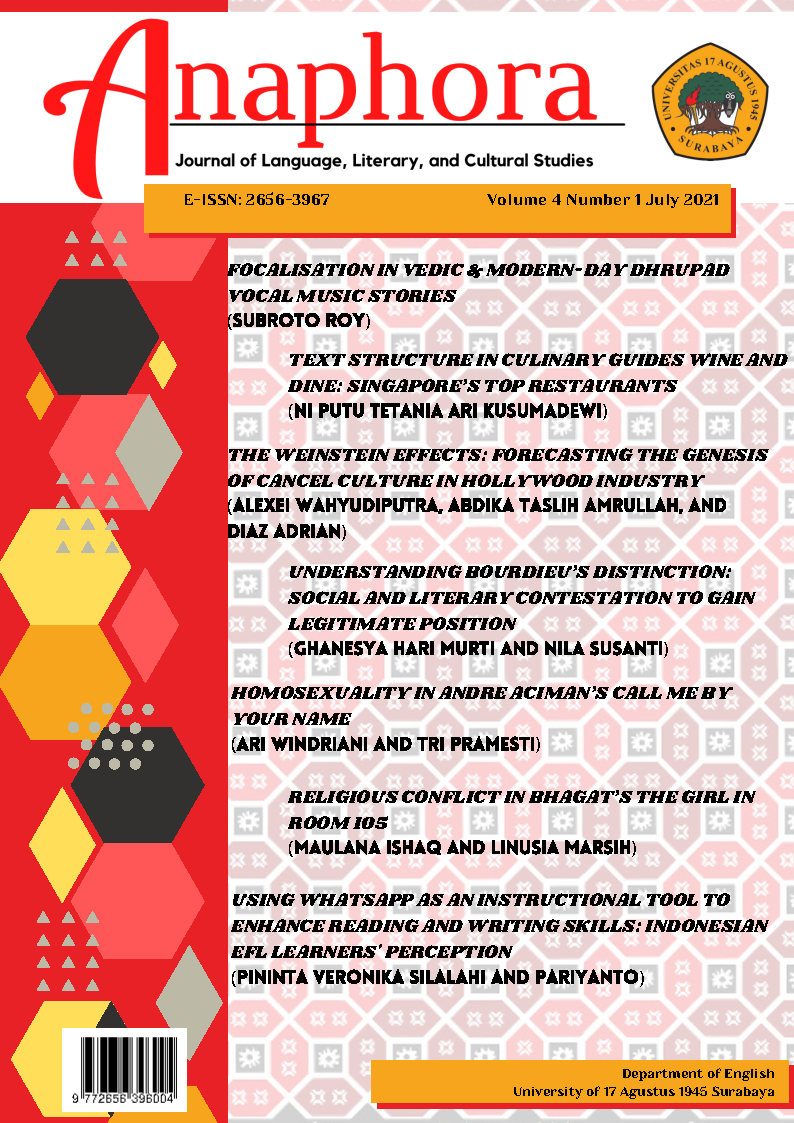USING WHATSAPP AS AN INSTRUCTIONAL TOOL TO ENHANCE READING AND WRITING SKILLS: INDONESIAN EFL LEARNERS' PERCEPTION
DOI:
https://doi.org/10.30996/anaphora.v4i1.5289Keywords:
WhatsApp, an intructional tool, Indonesian EFL Learners, perception, reading and writing skillsAbstract
This study intends to examine Indonesian EFL learners’ perception of using WhatsApp as an instructional tool to improve reading and writing skills. Covid-19 pandemic has made online learning compulsory for both teachers and students in which it is such a novel experience of instructional mode for some. WhatsApp as a pedagogical tool is thought to be feasible and readily available for the students and teachers to use at any time. With its features and capabilities to send multimedia messages such as images, recordings, audio, videos, and PDF files, it is believed to be potential to be used as a pedagogical tool. A five-point Likert scale questionnaire (1=strongly disagree; 2=disagree; 3=neutral/no opinion; 4=agree; 5=strongly agree) was employed to answer the research question. The result shows that the students perceived that using WhatsApp as a pedagogical tool can enhance reading and writing skills (average response = 3,53). It indicates that as a pedagogical tool, WhatsApp can be taken into account to be integrated into online learning.
Downloads
References
Alderman, S. (2017) Five ways to use WhatsApp in the EFL classroom. Retrieved from https://www.english.com/blog/5-ways-use-whatsapp-elt-classroom/
Ally, M. & Prieto-Blázquez, J. (2014). What is the future of mobile learning in education? Mobile Learning Applications in Higher Education [Special Section]. Revista de Universidad y Sociedad del Conocimiento (RUSC).11(1), 142-151. doi http://dx.doi.org/10.7238/rusc.v11i1.2033
Barhoumi, C., & Rossi, P. G. (2013). The Effectiveness of the instruction-oriented hypertext systems compared to direct instruction in e-learning environment. Contemporary Educational Technology, 4, 281–308 https://files.eric.ed.gov/fulltext/EJ1105506.pdf
Cashin, W. E., & Downey, R. G. (1992). Using global student rating items for summative evaluation. Journal of Educational Psychology, 84(4), 563-572. https://doi.org/10.1037/0022-0663.84.4.563
Cashin, W. E., & Downey, R. G. (1999). Using global student rating items for summative evaluation: Convergence with a second criterion. Paper presented at the annual meeting of the American Educational Research Association, Montreal, Quebec, Canada.
Centra, J. A. & Gaubatz, N.B. (2005). Student Perceptions of Learning and Instructional Effectiveness in College Courses: A Validity Study of SIR II. SIR II, pp: 1-48. Accessed on June, 3rd, 2021 from https://www.ets.org/Media/Products/perceptions.pdf
Chen, B. & Bryer, T. (2012). Investigating Instructional Strategies for Using Social Media in Formal and Informal Learning. International Review of Research in Open and Distance Learning, 13 (1): 87- 104. https://files.eric.ed.gov/fulltext/EJ979641.pdf
Darnawati, Jamiludin, & Uke, W.A.S. (2016). To What extent use WhatsApp For English Language Teaching, ELTeaM International Conference Proceedings Volume 3: Celebrating Students’ Engagement. https://elteam2nd.files.wordpress.com/2017/12/301-to-what-extent-use-whatsapp-for-english-language-teaching-_-darnawati-et-al.pdf
Davie, N. & Hilber, T. (2015). Mobile-Assisted Language Learning: Student Attitudes to Using Smartphones to Learn English Vocabulary. Proceeding of the 11th International Conference Mobile Learning, pp 70-78. ISBN: 978-989-8533-36-4 https://files.eric.ed.gov/fulltext/ED562454.pdf
Dean, B. (2021). WhatsApp 2021 Users Statistics: How many People Use WhatsApp? Retrieved on July 15th, 2021 from https://backlinko.com/whatsapp-users
Hamad, M.M. (2017). Using WhatsApp to Enhance Students’ Learning of English Language “Experience to Share”. Higher Education Studies,7(4), 74-87. http://doi.org/10.5539/hes.v7n4p74
Hamilton, B. (2015). Integrating Technology in the Classroom: Tools to Meet the Needs of Every Student. Eugene: International Society for Technology in Education
Mbukusa, N. R. (2018). Perceptions of students on the Use of WhatsApp in Teaching Methods of English as Second Language at the University of Namibia. Journal of Curriculum and Teaching, 7(2), 112-119. https://doi.org/10.5430/jct.v7n2p112
Mistar, I. & Embi, M.A. (2016). Students’ Perception on The Use of WhatsApp as a Learning Tool in ESL Classroom. Journal of Education and Social Sciences, 4, (June), ISSN 2289-9855 https://www.jesoc.com/wp-content/uploads/2016/08/Edu-76.pdf
Gutiérrez-Colon, M., Gibert, M.I., Triana, I., Gimeno, A., Appel, C. & Hopkins, J. (2013). Improving learners’ reading skills through instant short messages: a sample study using WhatsApp, Global perspectives on Computer-Assisted Language Learning conference paper, Glasgow, 10-13 July 2013. https://www.researchgate.net/publication/255718202_Improving_learners%27_reading_skills_through_instant_short_messages_a_sample_study_using_WhatsApp
Rajendran, T. & Yunus, M.M. (2021). A Systematic Literature Review on the use of Mobile Assisted Language Learning (MALL) for Enhancing Speaking Skills among ESL and EFL Learners. International Journal of Academic Research in Progressive Education and Development, 10(1), 586–609. http://dx.doi.org/10.6007/IJARPED/v10-i1/8939
Ryan, J., & Harrison, P. (1995). The relationship between individual instructional characteristics and the overall assessment of teaching effectiveness across different instructional contexts. Research in Higher Education, 36(5), 577-594. https://doi.org/10.1007/BF02208832
Warman, L.A.D. (2018). Students’ Perception of Using WhatsApp in Blended Learning on Reading Comprehension. Journal of English for Academic, 5(2), 27-37. https://core.ac.uk/download/pdf/322502153.pdf
Verheijen, L. & Spooren, W. (2021). The impact of WhatsApp on Dutch youths’ school writing and spelling. Journal of Writing Research, 13(1), 155-191. https://doi.org/10.17239/jowr-2021.13.01.05
Vygotsky, L. S. (1978). Mind in society: The development of higher psychological processes. Massachusetts: Harvard University Press.
Zang, F. (2012). Combining the Body and Mobile Technology to Teach English Pronunciation. In F. Zang (Ed), Computer-enhanced and mobile-assisted language learning: emerging issues and trends (pp. 202-2019) Hershey: GI Global
Downloads
Published
How to Cite
Issue
Section
License
Authors whose manuscript is published will approve the following provisions:
-
The right to publication of all journal material published on the jurnal anaphora website is held by the editorial board with the author's knowledge (moral rights remain the property of the author).
-
The formal legal provisions for access to digital articles of this electronic journal are subject to the terms of the Creative Commons Attribution-ShareAlike (CC BY-SA) license, which means Jurnal Persona reserves the right to store, modify the format, administer in database, maintain and publish articles without requesting permission from the Author as long as it keeps the Author's name as the owner of Copyright.
-
Printed and electronic published manuscripts are open access for educational, research and library purposes. In addition to these objectives, the editorial board shall not be liable for violations of copyright law.















